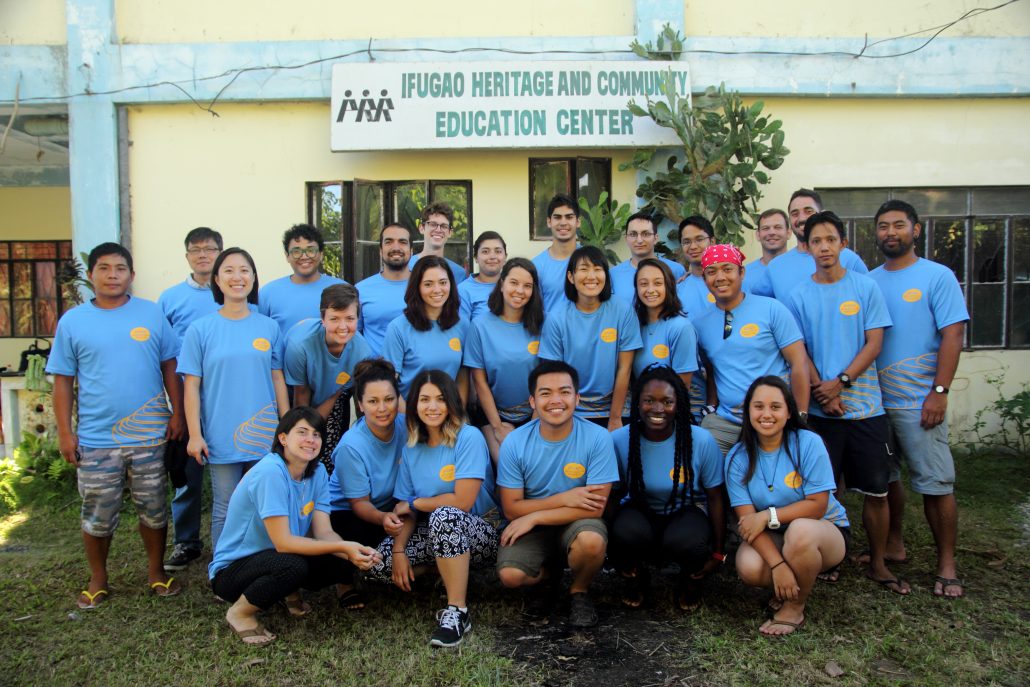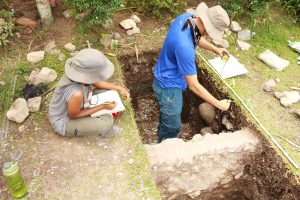Summer Field Research in the Philippines: Training and Heritage Discovery in the Philippines

The 2016 field school participants, Kiangan, Ifugao, Philippines
The UCLA Anthropology Program has actively engaged Filipino heritage students through The Ifugao and Bicol Archaeological Projects (IAP and BAP) by providing field research opportunities to students. These field projects have contributed to the competitiveness of the project alumni in the job market and graduate school applications. As an example, the IAP, which was launched in 2012 has placed 10 Filipino heritage students in various graduate programs (eight in anthropology, two in population health disciplines) around the country.
We would like to continue this program and intensify our engagement with students by raising funds to help students participate in summer field projects that I direct. The Filipino community in the country is badly underrepresented in the academe even though Filipinos comprise one of the largest Asian migrant populations in the US.
With your support, we would like to develop Philippine anthropological studies, particularly archaeology, and train Filipino and Filipino-Americans in the discipline. The anthropological archaeology program at UCLA is ranked 5th nationally and the archaeology program at the Cotsen Institute of Archaeology is ranked number one in the country.
A better understanding of the archaeology of the Philippines provides Filipinos and Filipino-Americans an enhanced ownership of their past. Philippine history narratives, especially those that tell of the origins of Filipinos are still based on the Waves of Migration Theory popularized by H.O. Beyer, considered as the founder of Philippine Anthropology. The model was initially introduced by Spanish-era scholars early in the Spanish colonial period. Ferdinand Blumentritt, an Austrian scholar during the Spanish-period Philippines, refined the model in 1882. Archaeologists have proposed several alternatives to the Waves of Migration Theory, based on archaeological data and sound modeling. Still, the Philippines’ elementary and high school textbooks use the outdated model proposed by Beyer.
We propose to develop a Philippine anthropology program at UCLA, through the Department of Anthropology. The program involves both research and training components. For the past five years, I have been actively training students from historically underrepresented groups through an archaeological field school that I supervise in the Philippines. I started out as an Assistant Professor at the University of Guam and moved to UCLA in 2013. I have continued the tradition of training students, with a significant Filipino-American participation in the field schools.
UCLA will be a great venue for such program. The Filipino population in California now composes the largest Asian ethnicity in the state, and majority of them are in Southern California. UCLA’s academic strength also provides a great space for Filipinos pursuing higher education.
We hope that this program spurs interest among Filipino-Americans to pursue higher degrees in anthropology and allied fields. This program allows us to produce highly competitive graduate that can take up professorships around the country, and thus, will represent Filipinos and Filipino-Americans in the academe.

Summer Project Description
The summer field program aims to provide a space for students to acquire research and real-life skills, specifically, the program seeks to accomplish the following goals: 1) involve undergraduate students in an ongoing research where students will be able to collaborate with Southeast Asian archaeologists and professors, and develop scientific-writing skills; 2) provide hypothesis-driven undergraduate projects with guidance from faculty mentors and international collaborators; 3) encourage students to pursue STEM-related and Archaeology graduate studies; 4) offer possible MA or PhD research area for student-participants wishing to pursue graduate studies; and, 5) provide a meaningful field experience to undergraduate participants by directly working with Ifugao descendant communities.
Our work in Ifugao, Philippines is an excellent locale to expose undergraduate students to the science of archaeological field research and community archaeology. The Ifugao Rice Terraces are a living cultural landscape and they are emblematic of Philippine heritage. More importantly, the IAP has actively engaged the community, though the participation of the Save the Ifugao Terraces Movement, Inc. (SITMo) and descendant communities, thus providing students the opportunity to experience working side-by-side with community members.
BAP, on the other hand, is a collaborative research project between various Local Government Units, the Archdiocese of Caceres, and UCLA. The research program looks at indigenous responses to Spanish colonialism and Bicol identity. Students will also be exposed to environmental science, botanical and faunal analysis, and ethnography.
The projects build on research and educational strengths of the University of California, Los Angeles. The established research strengths and demographic constituents of UCLA make it an excellent institution to bridge Asia, the Pacific, and the United States and explore issues that are relevant globally.
The program director, Stephen Acabado, has worked with undergraduate students for more than 10 years. He has also mentored undergraduate students who were participants of past field seasons of the IAP. Some of his students are now in anthropology and environmental studies graduate programs. In addition, several of the undergraduate students have presented in international meetings and published the results of their research in Ifugao on refereed journals.
We hope to recruit 5-6 students per year, who will work with Dr. Stephen Acabado as part of a mentorship program that will provide students the necessary tools to be competitive for graduate school applications and/or for employment. With enough financial support, we should be able to target the best students to participate in the program and ensure the sustainability of the project.
Support our Students
If you would like to donate, please click this link, which will bring you to the Department of Anthropology Giving Site: Giving to UCLA (Department of Anthropology).
Please choose UNDERGRADUATE SUMMER FIELD RESEARCH IN THE PHILIPPINES on the dropdown menu.
Your tax-deductible donation will be coursed through the UCLA Foundation.

